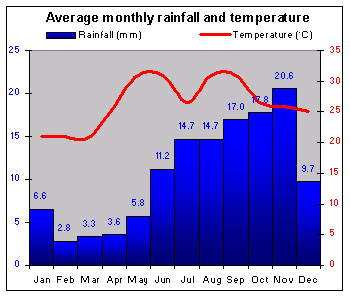COUNTRY INFORMATION |
Introduction |
Situated to the northeast of Trinidad, Barbados is the most easterly of the West Indian Windward Islands. In the 16th century, the Portuguese were the first Europeans to reach the island, then inhabited by Arawak Indians. However, Barbados was not colonized until the 1620s, when British settlers arrived. Popularly referred to by its neighbors as "little England," Barbados now seeks to forge a new national identity for itself. |
|
Climate |
 |
Barbados has a moderate tropical climate and is sunnier and drier than its more mountainous Caribbean neighbors. Hurricanes may occur in the rainy season. |
|
People |
| Languages |
Bajan (Barbadian English), English |
|
| URBAN/RURAL POPULATION DIVIDE |
|
|
|
Most Bajans are the descendants of Africans brought to the island between the 16th and 19th centuries; there are also small groups of south Asians and Europeans, mainly expatriates from the UK, many of whom take up residence on retirement. There is some latent tension between the white community, which controls most of the economy, and the majority black population, although this rarely spills over into violence. Increasing social mobility has allowed many black Bajans to move into the professions and the civil service. Barbados enjoys a higher standard of living than most Caribbean countries. |
|
Economy |
| GNP (US$) |
2469
|
M |
GNP World rank |
133
|
|
| Inflation |
2 |
% |
Unemployment |
10 |
% |
|
StrengthsWell-developed tourism based on climate and accessibility. Sugar industry. Information processing and financial services are important new growth sectors. WeaknessesNarrow economic base, vulnerable to downturns in tourism, failures of sugar harvest, and the sector's dependency on loans and secure markets. Relatively high manufacturing costs. |
|
Politics |
| Lower house |
Last election |
1999 |
Next election |
2004 |
| Upper house |
Last election |
1999 |
Next election |
2004 |
|
Barbados is a multiparty democracy. A primarily European, affluent elite finances the parties and has an indirect influence on government policy. The BLP swept to power in 1994 and won a further landslide in 1999. Owen Arthur, BLP leader and prime minister, prioritizes economic growth and international competitiveness. He has pledged to transform Barbados into a republic, while remaining a member of the Commonwealth. |
|
Resources |
| Minerals |
Oil, natural gas |
|
| Oil reserves (barrels) |
7.6m barrels |
Oil production (barrels/day) |
1604 b/d |
|
Barbados has few strategic resources. The domestic petroleum industry provides about one-third of the country's energy requirements. |
|
Health |
| Life expectancy |
77 |
Life expect. World rank |
28 |
| Population per doctor |
800 |
Infant mortality (per 1000 births) |
17 |
|
|
|
| Principal causes of death |
Cerebrovascular and heart diseases, cancers |
|
The health system is based on subsidized government-run clinics and hospitals, supplemented by more expensive private clinics and private doctors. Facilities are within easy reach of all Bajans. |
|
Education |
| Literacy |
98 |
% |
Expend. % GNP |
7 |
%
|
|
| PERCENTAGE OF POPULATION IN FULL TIME EDUCATION |
|
| Primary |
90 |
% |
Secondary |
100 |
% |
Tertiary |
29 |
% |
|
A seven-year plan to restructure education includes the rehabilitation of schools and a computerization program. Barbados hosts a campus of the University of the West Indies. |
|
Wealth |
| Cars |
229 |
per 1,000 population |
| Telephones |
437 |
per 1,000 population |
| Televisions |
285 |
per 1,000 population |
|
A significant disparity exists between most Bajans and a small affluent group, its members usually of European origin, which owns and controls business and industry, and parades status symbols such as yachts. Prime Minister Arthur stated in 1998 that "abject poverty" existed in the country.
|
History |
Colonized by the British in 1627, Barbados grew rich in the 18th century from sugar produced using slave labor. - 1951 Universal adult suffrage.
- 1961 Full internal self-government.
- 1966 Independence from Britain.
- 1983 Supports and provides a base for the US invasion of Grenada.
- 1994, 1999 The BLP wins two successive general elections.
|
|